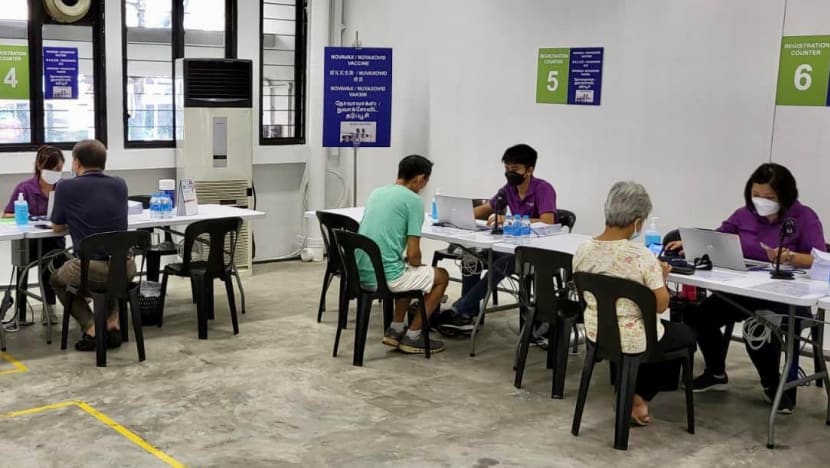Commentary: Four years in, why are some people hesitant about COVID-19 vaccine boosters?
Shaking off that vaccine inertia to at least consider getting a COVID-19 booster jab is something worth thinking about, says CNA's David Bottomley.

File photo of a Joint Testing and Vaccination Centre. (Photo: Facebook/Ong Ye Kung)
This audio is AI-generated.
SINGAPORE: I felt something akin to nostalgia when I visited the Joint Testing and Vaccination Centre at Kaki Bukit last week to get a COVID-19 booster jab.
This was the location where, almost exactly a year ago, I received my last booster. And while the COVID-19 landscape in Singapore has changed in the ensuing 12 months, nearly everything at the centre was reassuringly familiar.
There were the very friendly members of staff helping to guide people quickly and efficiently through the process, from registration to injection to observation.
Just like the last time, a small, circular sticker was issued to indicate which vaccine each person had elected to get - green for Pfizer, yellow for Moderna (having been a Moderna man before, I decided to mix it up a little by asking for the Pfizer jab). And there was the handing over of the leaflet telling me to limit physical activity for the next couple of weeks.
In fact, the only thing that differed from my last visit was that there weren’t many people getting their jabs. In the observation room, I was one of three people.
A year ago, the place was busy enough for there to be slight pauses at each stage of the process as the staff worked their way through the steady stream of people wanting to get protected.
This time round, I walked through the process very quickly, being dealt with immediately at every stage. Admittedly, this was on an early Friday evening, which is perhaps a time when many people were out and about doing other things.
Nonetheless, I expected the centre to be busier. With Singapore experiencing a spike in COVID-19 infections and with declining resistance cited as one of the reasons for this, I thought that many people would have used that as a prompt to get up to date with their vaccinations.
The estimated number of COVID-19 infection cases for the week of Dec 10 to Dec 16 was the highest recorded for the year, with 58,300 cases for epi-week 50, up from the previous record of 56,043 cases in the preceding week.
A total of 965 new COVID-19 patients were admitted to hospitals in the same week, up from 763 the previous week.
WHY ARE PEOPLE HESITANT TO RECEIVE COVID-19 BOOSTERS?
However, I then thought back to conversations I'd had with colleagues and friends over the past few weeks, which gave me a reality check about people’s appetite for boosters.
My network of acquaintances was enthusiastic at the height of the pandemic about embracing the vaccine and boosters. Now, there is some reluctance to bring their protection up to date.
The reasons that people gave me for not getting a booster were perhaps not surprising, ranging from the inconvenience of going for the jab to not wanting to suffer the day or two of a sore arm and the feeling of being a bit under the weather as the body’s defence mechanism kicks into gear.
Some people mentioned a vague, not very coherent concern about putting things in their body, while others hadn’t even considered whether they should get a booster.
Also, COVID-19 is a very different beast from how it was at the height of the pandemic, when catching it could result in major health challenges. It still can, of course, but many of my acquaintances have had at least one bout with the virus and have come through it without too much difficulty.
What they may be forgetting, though, is that it is likely that one of the reasons they were able to get back on their feet after a few days was because their vaccines were up to date and current. The latest update from the Ministry of Health (MOH) makes that clear, where it says that vaccination is the primary defence against COVID-19, and “continues to be effective in preventing severe illness”.
It goes on to say that hospitalisation rates are considerably lower amongst those who have kept up to date with their vaccinations compared with those who have not (“up to date” means getting an additional dose within the last 12 months, says MOH).
According to infectious diseases experts that TODAY spoke to, inertia in keeping up to date with vaccines is a key factor in the growing number of COVID-19 cases.
The longer it has been since getting a booster (or coming down with the virus), the more likely it is that people will fall sick, said Rophi Clinic’s Dr Leong Hoe Nam.
STAYING COVID-19-FREE DURING THE FESTIVE SEASON
Shaking off that inertia to at least consider getting a booster is something worth thinking about.
After all, we’re about to get into a long period of celebrations and holidays, kicking off with Christmas and continuing with seeing in the New Year. And before we know it, Chinese New Year will be here.
These are times when many people will be visiting with friends and family, some of whom will be elderly and vulnerable. Many of us will also be attending parties and celebrations, mixing with big groups.
MOH’s advice is clear. The elderly, the medically vulnerable and residents of aged care facilities are strongly advised to get a shot of the updated vaccine if their last dose was more than a year ago. Everyone else aged six months and above is encouraged to receive the additional dose.
If we want to enjoy the festive season to its fullest extent without us or our loved ones being laid low by a bout of COVID-19, then paying attention to that may be worthwhile.
David Bottomley is deputy chief editor of CNA Digital News.








